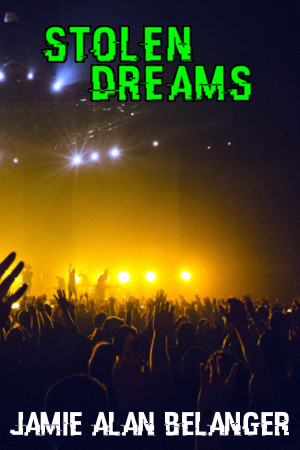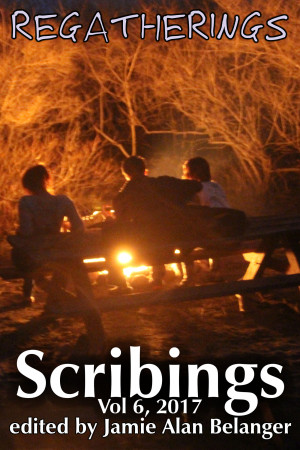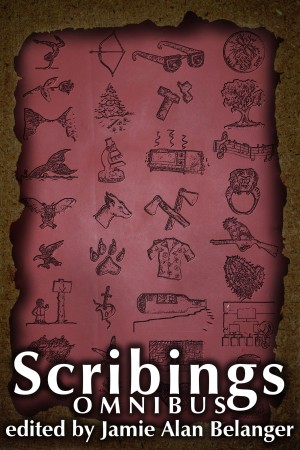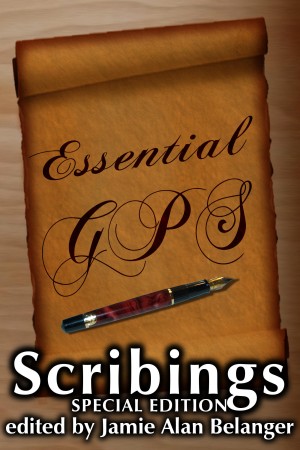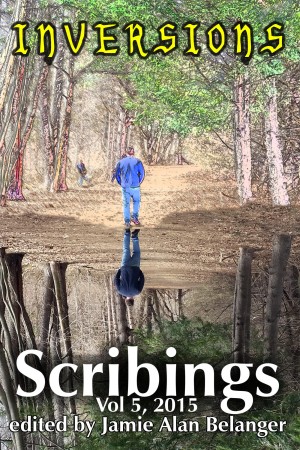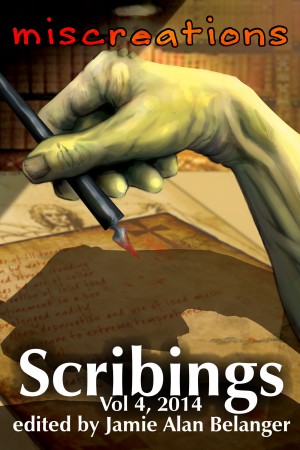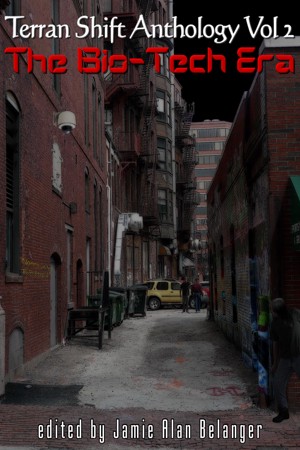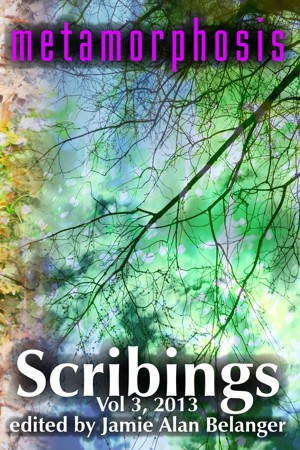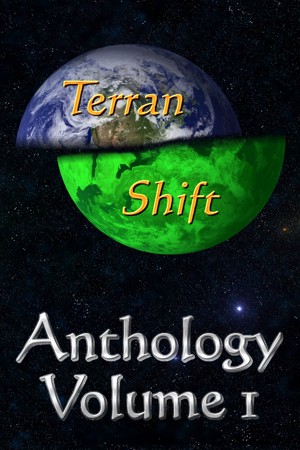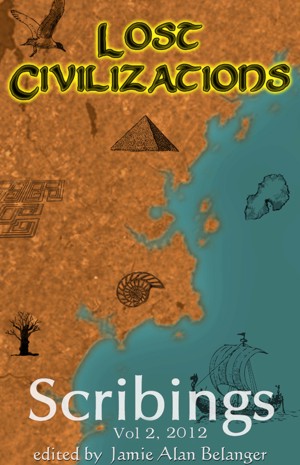Share with Friends
Interview with Jamie Alan Belanger
Published 2014-07-09.
Smashwords Interviews are created by the profiled author or publisher.
Latest books by This Author
Stolen Dreams
by Jamie Alan Belanger
Price:
$0.99 USD.
Words: 22,180.
Language:
American English.
Published: March 29, 2020
by
Lost Luggage Studios, LLC.
Categories:
Fiction » Science fiction » Cyberpunk, Fiction » Themes & motifs » Crime
In the near future, most people have an implant for connecting to the Net, brain-first. When they die, all of their thoughts, hopes, dreams, and memories are extracted and encoded in the Soul Bank. But the memories are just data, and one day a hacker learns how to steal those memories, and how to sell them.
Meet Jeremiah Jones: visionary, entrepreneur, sociopath.
Name your dream.
Name your price.
Scribings, Vol 6: Regatherings
by Jamie Alan Belanger
Series: Scribings.
Price:
$3.99 USD.
Words: 60,610.
Language:
American English.
Published: December 15, 2017
by
Lost Luggage Studios, LLC.
Categories:
Fiction » Anthologies » Short stories - multi-author
This anthology explores the bonds between people. Whether trying to save a childhood retreat from corporate interests, reuniting with old friends, returning home for a final goodbye, or trying to cope with a dear one who won’t depart, these tales are about the twisting journeys of our relationships. It's the people with whom we connect who shape our experience on this world.
The Scribings Omnibus
by Jamie Alan Belanger
Series: Scribings.
Price:
$9.99 USD.
Words: 286,700.
Language:
American English.
Published: December 15, 2015
by
Lost Luggage Studios, LLC.
Categories:
Fiction » Anthologies » Short stories - multi-author
For the past five years, the Greater Portland Scribists writing group has been independently publishing their fiction in annual anthologies. This Omnibus edition combines almost every story we've published. Ten of our current and previous members have contributed a total of 44 stories to this collection.
Essential GPS: A Scribings Special Edition
by Jamie Alan Belanger
Series: Scribings.
Price:
Free!
Words: 65,090.
Language:
American English.
Published: November 30, 2015
by
Lost Luggage Studios, LLC.
Categories:
Fiction » Anthologies » Short stories - multi-author
The Greater Portland Scribists formed in July 2010 and published their first anthology the following June. Since then, they have published an anthology every summer. After publishing volume 5, they decided it would be fun to look back over the years and choose the best stories from each author. This collection is a great sampler of work spanning the years that we've been working together.
Scribings, Vol 5: Inversions
by Jamie Alan Belanger
Series: Scribings, Book 5.
Price:
$3.99 USD.
Words: 62,500.
Language:
American English.
Published: July 30, 2015
by
Lost Luggage Studios, LLC.
Categories:
Fiction » Anthologies » Short stories - multi-author
Life is full of surprises. Sometimes changes upend everything we thought we knew, inverting our perceptions of the people and world around us. Part of the joy and terror of living lies in experiencing these inversions. Scribings, Vol 5: Inversions presents eight stories from the Greater Portland Scribists, each with its own hidden twists and surprises.
Scribings, Vol 4: Miscreations
by Jamie Alan Belanger
Series: Scribings, Book 4.
Price:
$2.99 USD.
Words: 86,070.
Language:
American English.
Published: July 9, 2014
by
Lost Luggage Studios, LLC.
Categories:
Fiction » Anthologies » Short stories - multi-author
Miscreations are things that should not exist, but do. Scribings, Vol 4: Miscreations contains twelve stories from the Greater Portland Scribists that explore these oddities. Errors in evolution. Discoveries in supposedly clean rooms. Extreme memory loss. Appliances that are a little too smart. Mythical beasts reborn. And one joke that went way too far.
Terran Shift Anthology, Vol 2: The Bio-Tech Era
by Jamie Alan Belanger
Series: Terran Shift Anthology, Book 2.
Price:
$2.99 USD.
Words: 62,320.
Language:
English.
Published: December 30, 2013
by
Lost Luggage Studios, LLC.
Categories:
Fiction » Science fiction » Cyberpunk, Fiction » Anthologies » Short stories - multi-author
Terran Shift Anthology, Volume 2: The Bio-Tech Era is the second collection of stories set exclusively in the Terran Shift universe. The collection contains seven science fiction stories from five authors, focusing entirely on stories set in the Bio-Tech Era, a plausible near-future where humanity becomes even more dependent on technology.
Scribings, Vol 3: Metamorphosis
by Jamie Alan Belanger
Series: Scribings, Book 3.
Price:
$2.99 USD.
Words: 54,200.
Language:
English.
Published: June 18, 2013
by
Lost Luggage Studios, LLC.
Categories:
Fiction » Anthologies » Short stories - multi-author, Fiction » Science fiction » General
Change is inevitable. Everything that happens in your life alters you, forever, for better or worse. Scribings, Vol 3: Metamorphosis contains six stories from the Greater Portland Scribists that explore how individuals and societies deal with transformations.
Terran Shift Anthology, Vol 1
by Jamie Alan Belanger
Series: The Sol-Bect War, Book 3 · Terran Shift Anthology, Book 1.
Price:
$2.99 USD.
Words: 39,820.
Language:
American English.
Published: November 9, 2012
by
Lost Luggage Studios, LLC.
Categories:
Fiction » Science fiction » General, Fiction » Anthologies » Short stories - multi-author
The Terran Shift Anthology, Volume 1, the first collection of stories set exclusively in the Terran Shift universe, contains seven science fiction stories from five authors set in all four eras -- from Bio-Tech dystopia to The Sol-Bect War era. This anthology includes The Sol-Bect Setup, the thrilling lost chapter in which Peter McCabe visits the past to lay the groundwork for his future.
Scribings, Vol 2: Lost Civilizations
by Jamie Alan Belanger
Series: Scribings, Book 2.
Price:
$2.99 USD.
Words: 61,040.
Language:
American English.
Published: June 29, 2012
by
Lost Luggage Studios, LLC.
Categories:
Fiction » Anthologies » Short stories - multi-author
Journey into lands long lost with the Greater Portland Scribists. Scribings Vol 2: Lost Civilizations contains eight exciting stories that will take you on a trip through Ancient Egypt, Viking lands, Atlantis, and more. Includes stories from trusted veterans Richard Veysey, Cynthia Ravinski, and Jamie Alan Belanger; as well as stories from new members Christopher L. Weston and Timothy Lynch.

